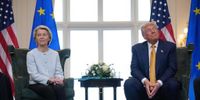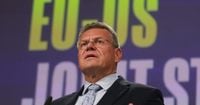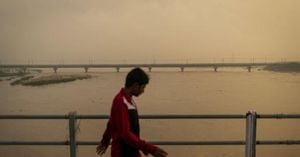Poland’s new president, Karol Nawrocki, will make his first foreign trip on September 3, 2025, meeting US President Donald Trump at the White House. Ordinarily, such a visit would be a chance for Poland to underscore its growing influence as a key European power. Yet, as Bloomberg reports, the lead-up to this meeting has exposed a deepening political rift within Poland itself, threatening to undermine the country at a moment when its global standing should be on the rise.
This moment of political fragility in Warsaw comes at a particularly sensitive time for Europe. The continent is not only grappling with its own internal divisions but also facing external pressures from Washington. President Trump’s unpredictable approach to Europe has forced EU leaders into a delicate balancing act, as they attempt to safeguard their interests while managing a relationship with a US administration that has shown little hesitation in using trade threats and diplomatic brinkmanship to get its way.
According to POLITICO, these tensions were on full display on September 1, 2025, when EU Trade Commissioner Maroš Šefčovič made a last-minute intervention to halt the European Commission from issuing a penalty against Google for its search advertising practices. The penalty, the result of a four-year Adtech investigation, was expected to be announced that day. However, Šefčovič’s move—made against the wishes of Competition Commissioner Teresa Ribera—came amid ongoing trade threats from President Trump, highlighting the extent to which US pressure is shaping EU decision-making.
For many in Brussels and beyond, this episode is emblematic of a broader dilemma: Europe’s strategy of placating Trump, often through high-profile gestures and significant concessions, is failing to yield the stability and reciprocity European leaders had hoped for. In a sharply worded analysis published on September 3, 2025, Zaki Laïdi, a former special adviser to the EU’s foreign policy chief, argued that Europe’s “strategy” of flattering Trump and abasing itself has not worked. Instead, Laïdi contends, Trump’s unpredictability is not just a quirk of personality but a deliberate modus operandi designed to keep European leaders off balance.
“Trump seeks to instill insecurity in others, so that they cannot organize a potent or coherent response,” Laïdi writes. “Although he claims otherwise, Trump wants Europeans to be more dependent on the US, even as he detaches the US from Europe’s fate.”
One need only look at the recent trade “deal” struck between Trump and European Commission President Ursula von der Leyen for evidence of this dynamic. As Laïdi details, Europe made four major concessions: accepting the “America First” narrative that US-European economic relations are unbalanced in Europe’s favor (despite evidence to the contrary), agreeing to a 15% tariff on US imports from Europe while sparing American exports, and acquiescing to the threat of new retaliatory tariffs against European digital regulations such as the Digital Services Act and Digital Markets Act.
The economic stakes are staggering. Europe has committed to increasing its energy imports from the US to $250 billion per year—up from around $65 billion today—and to invest an additional $200 billion annually in the US. On top of that, European nations have agreed to purchase more US military equipment, even as they attempt to build up their own defense industries. Most eye-catching of all, Europe is now financing a $100 billion Ukrainian bid to buy American military equipment—four times what Europeans have committed to Ukraine this year, and more than all the military aid Europe has furnished to Ukraine since 2022.
Despite these concessions, Trump’s willingness to make deals with other world powers—sometimes at Europe’s expense—has not abated. At a recent summit with Russian President Vladimir Putin in Alaska on August 15, 2025, Trump reportedly accepted the possibility of peace negotiations without a ceasefire and entertained the idea of a “land swap,” a euphemism for Ukraine ceding territory to Russia. Notably, no European leaders were publicly involved in these talks, underscoring Europe’s marginalization in key security matters affecting the continent.
“Trump wants to be the ultimate arbiter who refuses to take sides, which means deliberately putting the aggressor and the aggressed on the same footing,” Laïdi observes. This approach, he warns, leaves Europe dangerously exposed and unable to chart its own course in the face of Russian aggression and American unpredictability.
Yet, not all recent interactions between European and American leaders have been so fraught. In June 2025, European Commission President Ursula von der Leyen surprised many by taking a more personal approach with Trump at a Group of Seven summit in Canada. As reported by Dow Jones & Company, von der Leyen took Trump by the arm and led him to a private sofa for a candid discussion on Ukraine, China, and trade. Her aides credit these behind-the-scenes efforts with helping to bridge a divide with Trump and thaw what had become frosty trans-Atlantic relations.
Still, the underlying issues remain unresolved. Europe’s continued reliance on the US for security and economic stability is increasingly at odds with calls for greater autonomy. Laïdi argues that European leaders must now prioritize three key objectives: facilitating Ukraine’s accession to the EU (without lowering standards for membership), providing credible security guarantees for Ukraine (even as Germany, Poland, and Italy have ruled out deploying troops), and engaging in direct dialogue with Russia—ideally through a quadripartite conference that includes Russia, Ukraine, Europe, and the US.
“Success in international politics is shaped by three factors: the principles you defend, the balance of forces that underly your reality, and your will to act. Europe has the first, and it understands the second. Whether it can check the third box remains to be seen,” Laïdi concludes.
As President Nawrocki prepares to meet Trump in Washington, the stakes for Poland—and for Europe as a whole—could hardly be higher. The outcome may well depend on whether Europe can move beyond crisis management and develop a coherent, independent strategy that secures its interests amid an increasingly volatile international landscape.





